Movendi International Members Respond to COVID-19 Crisis
Movendi International works with different approaches and on different problems but together, as a movement, we tackle alcohol and others drugs as obstacles to development to promote justice, democracy and Human Rights for all. Our member organizations are often central in their communities, providing essential information, services and opportunities for engagement.
In the ongoing public health crisis that is COVID-19, Movendi International members have shifted gear and are responding in impressive and inspiring ways to the pandemic. There is a vast number of member organizations who are running critical initiatives as part of the fight against the novel coronavirus and for the protection of people, families and communities. The initiatives range from information campaigns in the most marginalized villages, to online meetings and workshops, to offering healthy activities and coping advice for children, to making protective equipment and delivering face masks.
Here, we are compiling a worldwide overview of how Movendi International member organizations are stepping up in the face of this unprecedented public health crisis.
This story was first published on April, 14 2020 and was updated and republished with new information on November, 30 2020.
Movendi members respond to COVID-19 crisis in Asia
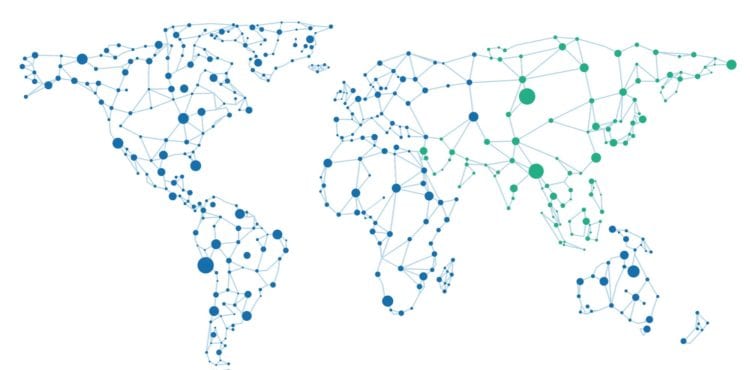
In Asia, we highlight the work of our members in India, Sri Lanka, Thailand and Cambodia, where our members are responding in different ways to help the people in their countries cope with the pandemic.
ADIC, Sri Lanka: Informing the community, exposing harmful industries and donating to COVID-19 response fund
All volunteers of the Alcohol and Drug Information Centre (ADIC) and ADIC’s youth activists of the Youth Action Network (YAN) are actively involved in all activities. For example, ADIC started a social media campaign to inform alcohol users and smokers about the heightened risks associated with alcohol and tobacco use concerning infection and possible complications with COVID-19.
ADIC also advocated for the national government as well as local authorities to take policy decisions to protect people against alcohol and tobacco harm during the public health crisis, for example through banning smoking at least until the pandemic is over; and to ban or limit alcohol sales until the crisis is over. Subsequently, the government took a decision to close all liquor shops.
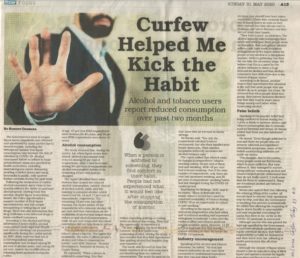
ADIC conducted a social media campaign to use the reduced availability of alcohol and tobacco during COVID-19 lockdown in the country as an opportunity to become free from use of alcohol, tobacco and other drugs. While it may be difficult to quit/ reduce use and experience its benefits under normal circumstances, the situational influences during COVID-19 provided a chance to people to experience the benefits of being free from use. Our youth network and activists in the field promoted the messages and posts on social media. The public was receptive to the messaging and it led to a positive change in communities.
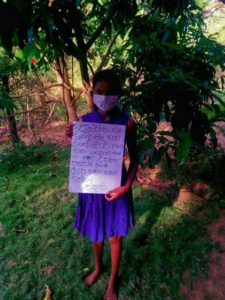
ADIC conducted another campaign focusing on children’s voices requesting the president to keep alcohol outlets closed. COVID-19 threatened the livelihoods of many people in the country. Alcohol use worsens family economy in such a crisis by draining whatever little money there is. The children requested to keep alcohol outlets closed and save their families from this drain and protect their right to live happy lives with good food and education. Posts of their requests were shared on social media. This campaign was picked up by national media.
ADIC conducted a survey from the 1st to 10th of May 2020 to estimate the alcohol and tobacco use during the initial COVID-19 curfew in Sri Lanka when availability decreased. It was found that 80% of alcohol users and 68% of tobacco smokers have reduced their consumption. The findings were publicized on national media and social media to motivate people to become free from use.
Furthermore, ADIC keeps working on exposing the alcohol industry and how they try to exploit the crisis for their profits. ADIC is collecting all the alcohol promotions and is sending them to relevant authorities. Part of this work is to caution the authorities and the public about the alcohol industry trying to white-wash their image by donating sanitizers and some medical equipments, while at the same time, the industry is using unethical marketing strategies to convert people to using harmful substances. ADIC works to educate the general public on how the subtle strategies of the industries work.
In the all above activities, ADIC jointly works with WHO in Sri Lanka, medical professionals and public health professionals.
Apart from these activities, ADIC also financially contributed to the NGO secretariat activities to provide food and other necessary items to vulnerable people in dire need of support.
NADA India Foundation – supporting youth during COVID-19 pandemic and striving for more and more youth participation for community development
During COVID-19 pandemic, NADA India conducted various activities directed at developing local youth activism, building capacity and spreading knowledge on COVID-19 and NCDs and their risk factors such as alcohol and tobacco.
Covid-19 situation has worsened everyone’s lifestyle habit especially youths. Their lifestyle pattern has become more sedentary compiled with increase intake of junk food and beverages. NADA India noticed the harmful ways in which Big Alcohol, Tobacco and Food companies exploited this pandemic situation to sell their products.
Once the lockdown was announced, most schools and institutions in India were shut down and students were exposed to more unhealthy advertisements on social media. Using the same social media platform and digital advocacy, NADA India Foundation was showing how youth can benefit from healthy information and also practice a healthy well-being in a fun and inclusive way.
Through peer education, peer support and peer leadership model, NADA India started conducting online capacity building workshops that focused on: NCDs and Covid-19, risk factors of NCDs, surrogate advertising and other forms of marketing strategies used by Big food and beverages.
NADA India has so far educated 550 peer educators, 31 peer supporters and 5 peer leaders coming from across 29 states in India with diverse education background. Peer leaders have been trained in the field of NCDs and its associated risk factors and Covid-19 as well as on the methods of effective communication and spreading knowledge about COVID-19.
For ‘World no-tobacco day’ a campaign was organized that addressed concerns on adolescent drug abuse and while India was heading towards Covid-19 peak, an ‘Emotional CPR and helpline’ first aid workshop was conducted by NADA India’s Chairperson Mr. Suneel Vatsyayan.
During the pandemic, NADA India organized also webinars dedicated to youth on the harmful marketing strategies used by alcohol and tobacco industries as well as psycho-social factors that lead to eating disorders among adolescents and PCODs. Nada India and its youth volunteers are now running for the Airtel Delhi Marathon from 25th – 29th November to support physical well-being following recent WHO guidelines to encourage more adolescent in physical engagement.
While most schools cancelled their social work internship amidst the lockdown, NADA India Foundation was the first CSO to provide a virtual internship opportunity for Department of Social work Kashi Vidyapeeth University, Central University Jammu, Delhi University and Department of Public Health Amity University and Psychology Department at Christ University.
Based on activities conducted during pandemic and gained knowledge, NADA India Foundation has decided to create a new project – VLEAD Academy – it stands for Vidya meaning correct ownership of knowledge, Leadership, Enrichment, Action and Distinction. that was launched on December 5th, 2020 at the National Youth Conclave 2020.
Stop Drink Network, Thailand: Community information about health and safety and national level advocacy to prevent and reduce alcohol harm
The Stop Drink Network (SDN) in Thailand is also responding to COVID-19 on both the community and the national level. On the community level, SDN promotes information through grass-roots activists about how to stay safe and healthy during the pandemic, including about the effects of alcohol causing to weaken a person’s immunity system.
On national level, SDN supports a total ban of the sale of alcoholic beverages in all provinces. Some of provinces have instituted a ban until April 30, but some other provinces have so far only banned alcohol retail until April 20.
PDP-Center, Cambodia: Community information, advocacy and alcohol industry counter-action
The People Center for Development and Peace (PDP) in Cambodia also works on different levels with their response to the COVID-19 crisis in the country.
In the villages, PDP works to raise awareness of hygiene and protection requirements to avoid infection with the novel coronavirus. PDP has identified that gatherings to consume alcohol are risky settings for the spread of COVID-19. And in general, people’s awareness of and understanding about what they can do to protect themselves needs to increase in the villages.
PDP also works to address alcohol harm that is likely increasing during the crisis, such as domestic violence and child abuse.
Thirdly, PDP advocates towards the government to ban alcohol advertising – counter-acting Big Alcohol’s attempts to convert Cambodians to alcohol users during the public health crisis – and to ban alcohol retail during the crisis to limit the spread of the virus and to reduce violence and injuries. Especially with the Khmer New Year celebrations there is the danger that alcohol consumption might lead to increased spread of the novel coronavirus.
During this time of the coronavirus pandemic, PDP-Center sent a letter asking the Minister of Information to suspend all alcohol advertisement via television, radio and public advertising, and increase awareness of Covid-19 prevention and protection measures to be broadly understood by people. The same letter was sent to Minster of Interior by including the same message to local authorities at all levels. As the result, 18 advertisings/billboards were removed from alcohol advertisement to awareness of Covid-19 prevention and protection measures along Cambodia-Russia and Kampuchea Krom Streets.
Sarvodaya Samiti, Odisha, India: Providing protective masks to the most vulnerable
Our member organization in the Indian state of Odisha, Sarvodaya Samiti, works to provide protective face masks to children living in childcare institutions in the state.
Sarvodaya Samiti is committed to promoting the development of tribal, rural and other underprivileged classes of society in the state of Odisha. View this post on Instagram
A post shared by Sarvodaya Samiti (@sarvodaya_samiti) on Apr 12, 2020 at 3:50am PDT
Movendi members respond to COVID-19 crisis in Africa
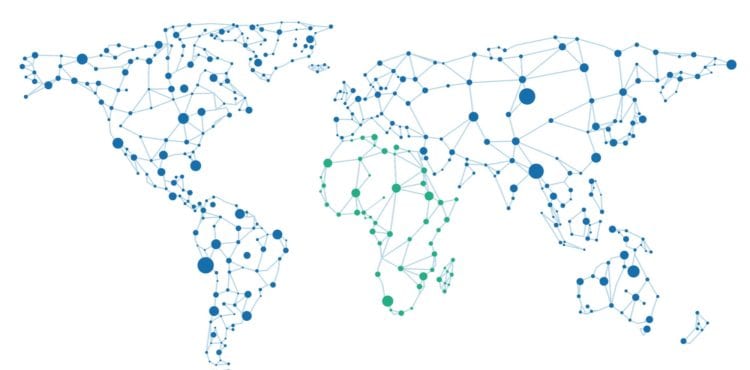
In Africa, we highlight the work of our members in Kenya, Tanzania, Nigeria and Zimbabwe, where our members are responding in different ways to help the people in their countries cope with the pandemic.
Student Campaign against Drugs (SCAD), Kenya: Protecting children, supporting caregivers, countering Big Alcohol and advocating for alcohol policy measures
The Students Campaign against Drugs (SCAD) conducts a weekly Twitter Chat under the hashtag #ProtectChildren.
What immediate and long term measures are then necessary to build children’s mental resilience to the pandemic? @ka_dem_yvonne @solitagrace @bluecrosskisumu @ShemIshmael @syengomutisya @MOHmentalhealth @DBukusi #ProtectChildren pic.twitter.com/vMGjNKrM98
— SCAD KENYA (@scadkenya) April 9, 2020
This initiative targets and engages care givers to discuss and share tools and inspiration about measures they can take to protect children from adverse effects of the crisis. This weekly effort is supported by and conducted in concert with experts from the government and from non-profit sector.
SCAD, ACPN, others advocate against alcohol being listed as ‘essential product”
In an open letter, our members SCAD and the Alcohol Control and Policy Network in Kenya (ACPN) have partnered with other civil society organizations to respond strongly to the declaration by the trade ministry that alcohol was an essential product.
The 11 partners representing peak bodies of Kenyan society in Tobacco Control, Alcohol Control, Cancer Control, Drugs Control and Health Promotion express support for the government’s overall response to the COVID-19 crisis, including the travel restrictions in the country and the curfew.
But they also express strong criticism of the fact that the Ministry of Industrialization, Trade and Enterprise Development has chosen to enlist alcohol and tobacco as part of essential products (as reported in one of the local dailies dated April 08, 2020). They write in an open letter:
We believe that this move will not only make the Ministry of Health and the government’s efforts counterproductive in the fight against COVID-19 but also subject Kenyans to unnecessary yet preventable deaths…”
Slum Child Foundation, Kenya: Online conversation to prevent and reduce incidences of gender-based violence during COVID-19 crisis
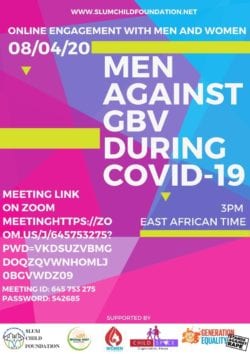
The Slum Child Foundation of Nairobi, Kenya aims to reduce the violence against the most vulnerable children of Kenyan slums through advocacy, mentoring, intervention and rehabilitation.
As reports are indicating rising numbers of violence against women during the current crisis, Slum Child Foundation has initiated online discussions under the theme “Men against GBV during COVID-19”. Using the Zoom platform, they bring together men and women to discuss strategies to prevent and reduce gender-based violence (GBV) and how to help affected women.
Women and Child Vision, Tanzania: Reaching those at risk of being left behind with critical hygiene and health information
Women and Child Vision (WOCHIVI) works in Arusha, Tanzania to rescue and bring up a healthier community through school-based interventions that tackle alcohol and other drugs as obstacles to development.
In the current COVID-19 public health crisis, WOCHIVI works to ensure continuity of health information of children from eight schools who need to stay at home now. To that end WOCHIVI volunteers contact of parent and caregivers/ guardians to reach the pupils. WOCHIVI volunteers are delivering knowledge via parents/ guardians on a daily basis about the effects of alcohol and prevention of COVID-19.
WOCHIVI is preparing questions and answers “games” and conveying different slogans on the effects of alcohol and prevention of COVID-19. One examples is the slogan disseminated in villages and rural communities: “Usiende kilabuni, epuka corona” (Do not go to bars, avoid COVID-19).
From these daily grass-roots activities, WOCHIVI can see a number of benefits arising:
- The knowledge and awareness has been broadened, as they are daily reaching the whole family, including parents and children.
- The bonds with parents are getting stronger due to daily communication about useful advice.
- Mobile phones really matter and it’s a lucky circumstance that every family has a mobile phone.
- The parents are using the smart phones to share video clips about their efforts to educate their kids.
Regarding the envirnmental dimension in the communities in Arusha, WOCHIVI is partnering with other stakeholders to provide education to communities and raise awareness about COVID-19.
They are purchasing and distributing protective equipment for COVID-19 such as gloves, masks, overalls, and hand made sanitizers. And they are working to create and distribute public service material with alcohol awareness slogans and information about prevention of COVID-19. Example: “Usishike pua, macho na mdomo, epuka corona” (Do not touch your nose, eyes and mouth, avoid Corona).
Wellbeing Initiative, Nigeria: Twitter health promotion campaign
The Wellbeing Initiative, a youth organization in Ibadan, Oyo State, Nigeria is launching a social media campaign and discussion on the topic of Non-communicable Diseases (NCDs) and COVID-19.
This #April, @thewellbeingi will be discussing Non-communicable Diseases (NCDs), how people living with #NCDs can limit their exposure to #Covid_19, and the healthy choices they can make during #SocialDistancing#HealthForAll #lifestyle#health#HealthyAtHome #HealTheWorld2020 pic.twitter.com/r32oZUelWe
— The Wellbeing Initiative (@TheWellbeingI) April 13, 2020
The focus of this effort will be to discuss how people living with NCDs (PLWNCDs) can limit their exposure to and risk of infection with the novel coronavirus. The discussion and campaign will also promote the healthy choices that PLWNCDs can make during times of physical distancing and social solidarity.
Youth against Alcoholism and Drug Dependence, Zimbabwe: Joint call for alcohol sales ban during crisis
Our member organization Youth against Alcoholism and Drug Dependence (YADD) work to build a community responsive to the life threatening nature of alcohol, tobacco and other drug abuse and to make prevention interventions and treatment of substance use disorders and related problems a priority.
As such, YADD as joined the Southern African Alcohol Policy Alliance in Zimbabwe (SAAPA Zim) in a call for the ban of alcohol sales during the lockdown in the country to limit the spread of COVID-19. They criticize the reversal of the alcohol retail and distribution ban in Zimbabwe, initially announced on April 2, 2020. SAAPA Zim argues, for instance:
The availability of alcohol will bring people out of their homes. This will increase the existing challenge of law enforcement and human rights abuses by overzealous law enforcement agents. The culture of sharing beer bottles and glasses when drinking beer compromises people’s adherence to hygiene and social distancing recommendations. Also, when people get intoxicated, their inhibitions and judgment become impaired thus further compromising their ability to practice COVID-19 prevention.
Banning the distribution and sale of alcohol during the COVID-19 crisis is a critical element in the country’s containment strategy to reduce strain on the limited health system so that it can respond to the needs of the pandemic, secondly, it will minimize non-adherence of physical distancing and hygiene advise due to intoxication.”
For Youth by Youth, Zimbabwe: Community kitchen for the most vulnerable ones
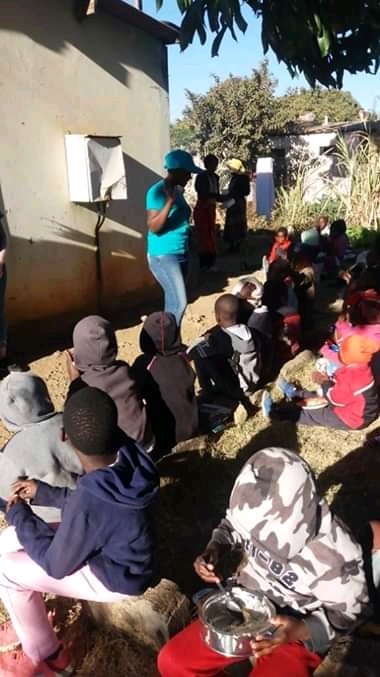
Our member organization For Youth By Youth (FYBY) in Zimbabwe had to act fast. In Zimbabwe most of the people are self-employed and the lockdown has led to many of them losing their source of income. FYBY has mobilized their resources to provide food for the most vulnerable ones and opened a community kitchen. Every day FYBY has been providing breakfast for children and while they got some nutrition into their bodies, FYBY shared information about the negative consequences of alcohol use especially in the times of COVID-19 pandemic.
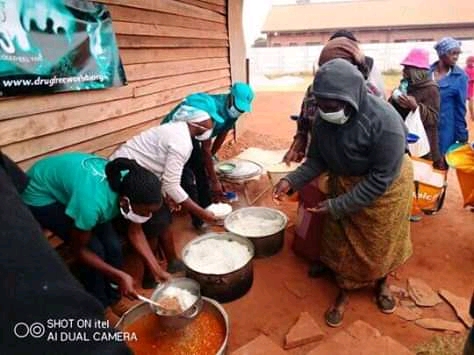
The pandemic has shown the extent of exposure to uncertainities many people need to face and FYBY continues to develop ideas for communities to find sustainable ways of living that will make people and families self-sufficient and more resilient.
Value Health Africa, Cameroon: Raising awareness on COVID-19 in all regions
Value Health Africa has been running their activities in all 5 regions of Cameroon addressing problems caused by COVID-19 pandemic. Their activities were directed at raising awareness on COVID-19 in local communities and supplying marginalized groups with hygiene products. Workshops and capacity building at local schools were financed by Prudencial beneficial insurance with aim to help fighting COVID-19.
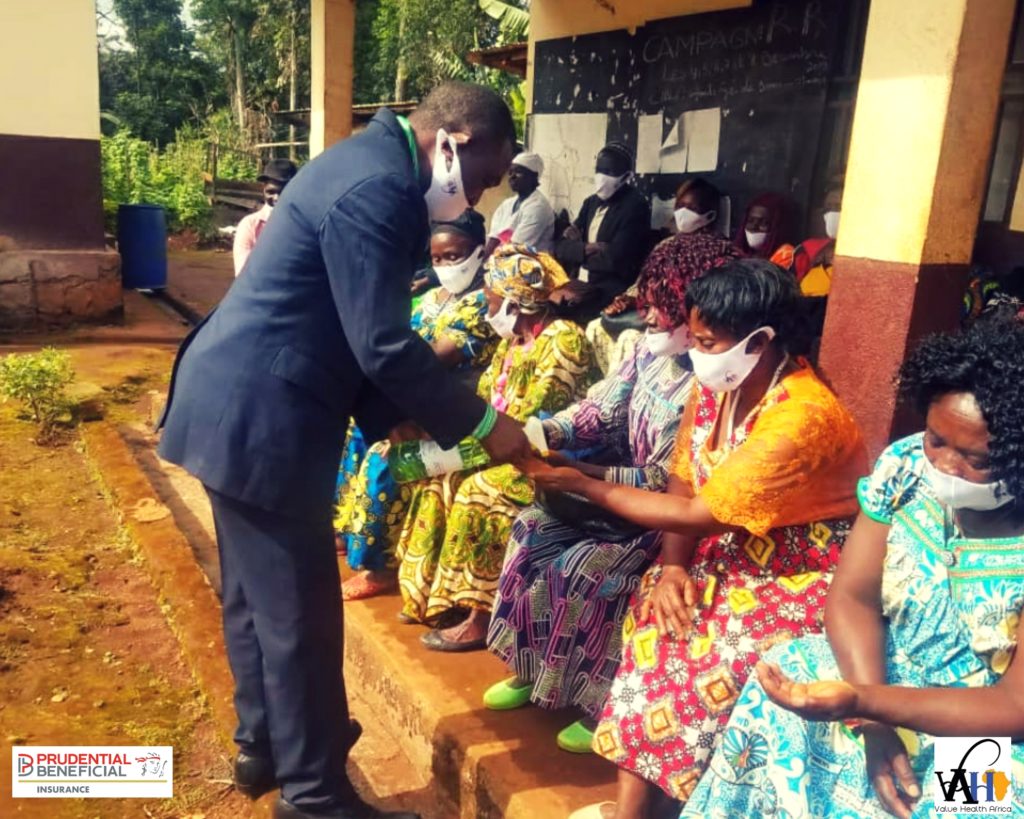
Value Health Africa provides education that strengthens community awareness on COVID-19 in high risk communities (IDPs, over-crowded, slums) in Bafoussam, Mbouda, Bamenda, Douala, Buea, Ngongsamba and Dschang. Around 1000 posters were spread carrying awareness messages on COVID-19. Moreover, 2100 community health workers went through the capacity building to educate others and improve detection of COVID-19 cases. Value Health Africa has established 35 hand washing stations in strategic points in vulnerable communities; supplied 20 underserved schools with hand washing stations, hand sanitizers and facemasks in four regions in Cameroon (five in Yaounde, Five in Douala, five in Bamenda and five in Bafoussam) as well as provided 20 orphanages with hygiene kits and food supplies and installed a mask production sites in two most vulnerable orphanages.
Uganda Youth Development Link: Protection from gender-based violence
All nine UYDEL drop in centers/safe spaces were closed and over 2000 slum youth and poor children were scattered and life became unbearable, there was a lot of hunger, and violence as most parents lost their jobs and access to family planning and other healthcare programmes was compromised. Children trying to cope in the pandemic were far worse off, some were exploited in the name of giving food (exchange for sex). There was a spike in sexual exploitation and abuse of children in the informal settlements and slums.’’.
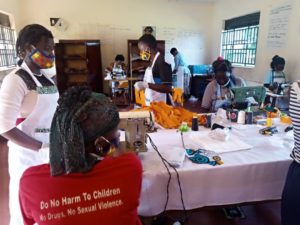
UYDEL requested for support from UCLA through Dr. Mary Jane Rotheram, OAK Foundation, Rapid Response, Plan International, ECPAT France, The Lutheran World Federation and Bread for the World responded positively and provided support. UYDEL has put together ‘’Personal Protective Equipment’’ (PPE), hygiene baskets composed of wash stands with buckets, soap and Dettol that with informational brochures were distributed through their networks and local government leadership to spread awareness regarding the spread of Corona virus and prevention of gender-based violence. UYDEL built capacities of alumni to offer peer support and make artisanal face masks for sale.
Movendi members respond to COVID-19 crisis in North America
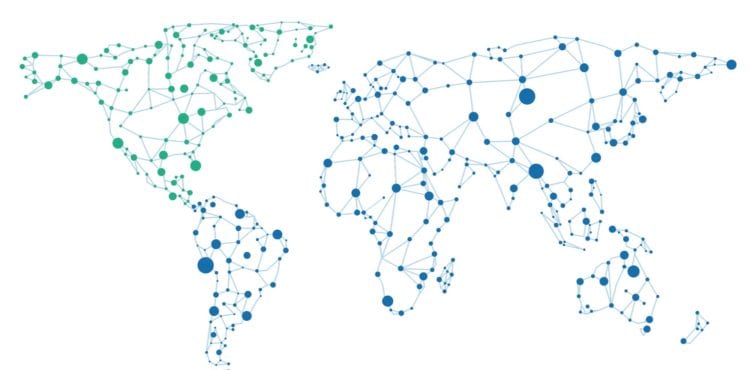
In North America, where we originated almost 170 years ago, we highlight the work of our members in the United States, where Young People in Recovery are responding in multiple ways to the pandemic.
Young People in Recovery, USA: Inspiring and supporting people in recovery and their friends and families during this crisis
COVID-19 is not stopping Young People in Recovery (YPR) from providing recovery support services. YPR is organizing virtual all-recovery meetings EVERY day of the week!
Locally, different chapters of YPR are creating innovative forums to connect and maintain community. For instance, the local YPR chapter in Columbus, Ohio organized a(virtual) open mic night!
YPR also offers a range of resources to inspire and empower people to maintain sobriety and continue their recovery. For example:
- How to support your friends and family in treatment during COVID-19,
- Check in on neighbors, especially older people and see how you could support them, or
- Sharing tips to stay socially connected while we are all physically distancing ourselves.
Movendi members respond to COVID-19 crisis in Europe
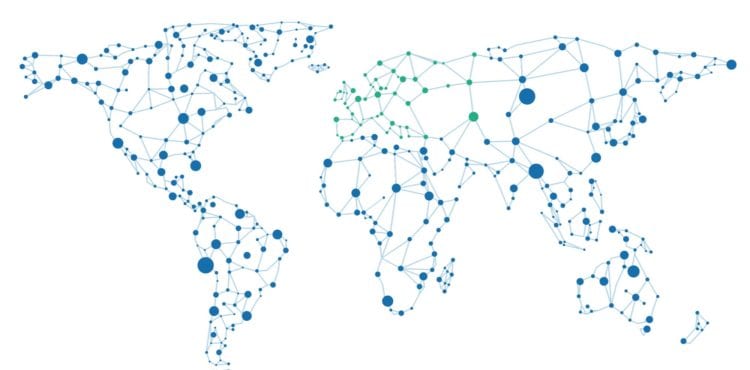
In Europe, we highlight the work of our members in Sweden, Norway, Germany, Slovakia, Slovenia, and Bosnia, where our members are responding in different ways to help the people in their countries cope with the pandemic.
Sweden
Junis: More Activity Offerings for Kids – both online and IRL
Junis, our Swedish child rights member organization, is also doing a lot to support children during the pandemic.
For example, Junis worked quickly to produce two extra editions of their beloved members’ magazine “Struten”. During spring, two Struten issues will be released so that children can enjoy the content at home and feel the connection to Junis.
Furthermore, Junis has created template plans for six outdoor activities to inspire Junis leaders.
All activities that Junis arranges IRL are adjusted to the new realities, with fun games to wash hands on arrival and departure and to practice maintaining physical distancing.
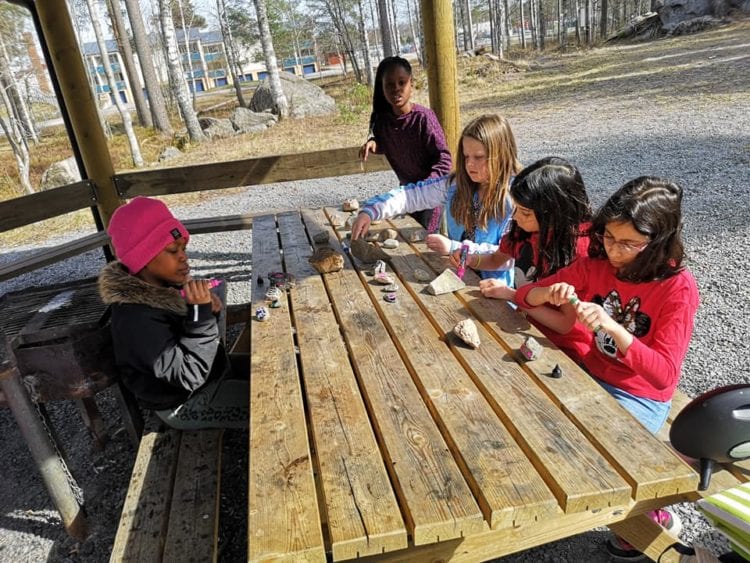
Junis has also produced an information poster for children to inform where vulnerable children can find support.
In addition, the organization is working to arrange digital/ semi-digital camps for children, in a safe and enabling way.
For Junis leaders, there will be digital training programs, approximately two per week, in the near future.
And politically, Junis continues to advocate for better and earlier identification of children from families with parental substance use problems. The new report will be released in an online session and the results of the report are set to be disseminated through webinars and short videos for social media.
UNF: Informing members and holding politicians accountable
Like many other Movendi members, UNF – the Swedish Youth Temperance Association – is working to inform its members about how to behave responsibly during the pandemic: where to find reliable information, how to behave and avoid risk of infection for one self and how to act in solidarity with others.
But UNF is also campaigning to hold politicians accountable. UNF’s presidents Filip and Jane published an Op-Ed requesting the temporary closure of the Swedish alcohol retail monopoly, Systembolaget, to help reduce alcohol harm and the burden this places on the healthcare system.
UNF argues that limiting alcohol’s availability – in Sweden alcohol is sold through a government-run monopoly that has removed the profit interest from alcohol retail – is an act of solidarity with all those children and youth at home that suffer from alcohol violence and have really nowhere else to go during the stay-at-home crisis measures.
IOGT-NTO: Mutual help for people in recovery, sober inspiration for all (members) and advocacy to counter Big Alcohol
IOGT-NTO, the biggest member organizations of Movendi International, is responding to the crisis in different ways, too.
For example, in online forums, members are sharing fun and healthy activities to spend time meaningfully during the physical distancing period. This was especially needed during the recent Easter holidays in Sweden. The hashtag #Nyktratillsammans (Sober Together), the dedicated Facebook page and activities in this spirit around the country all aim at creating community, sharing sober inspiration and supporting one another. Sometimes this can be a matter of survival, of staying on the recovery path and maintaining sobriety. Sometimes it can be about discovering new hobbies and interests. Always, it is about doing things together, learning from each other and being there for one another.
Even Sweden’s biggest daily newspaper, Dagens Nyheter, wrote about the initiative!
IOGT-NTO’s work to arrange mutual aid meetings around the country continues, too. Sweden does not have strict lockdown and stay-at-home laws which allows people in recovery to arrange their meetings – albeit under changed rules and following the recommendations fo the authorities. Maintaining routines and healthy habits is crucial for people who are struggling with or in recovery from substance use disorders. Therefore, the continuation of the support groups is important. But some participants needs to stay at home because they belong to high-risk groups, due to pre-existing conditions.
Keeping this mutual aid work up and running – as much as possible – is not only important for people that are already involved, but also for those who are likely to fall back into substance use problems, who cope with the stressful situation through alcohol and other drugs and who need support and help from peers. IOGT-NTO continue providing just that.
But IOGT-NTO is also an advocacy movement with members engaged in political work all over the country. And they have their hands full right now. The alcohol industry keeps lobbying for deregulating and weakening the successful Swedish alcohol policy model. And on local level, the alcohol industry has now found another way to violate the Swedish alcohol law: restaurants delivering alcohol to costumers.
“Microcatering” is the newest idea of the alcohol industry – tested in a small Swedish town and now spreading across the country. it is unlawful but the alcohol industry does not care. IOGT-NTO members in affected municipalities are advocating in defense of the alcohol law and for the immediate suspension of these harmful practices.
Norway
Edru Livstil: Monday online workouts
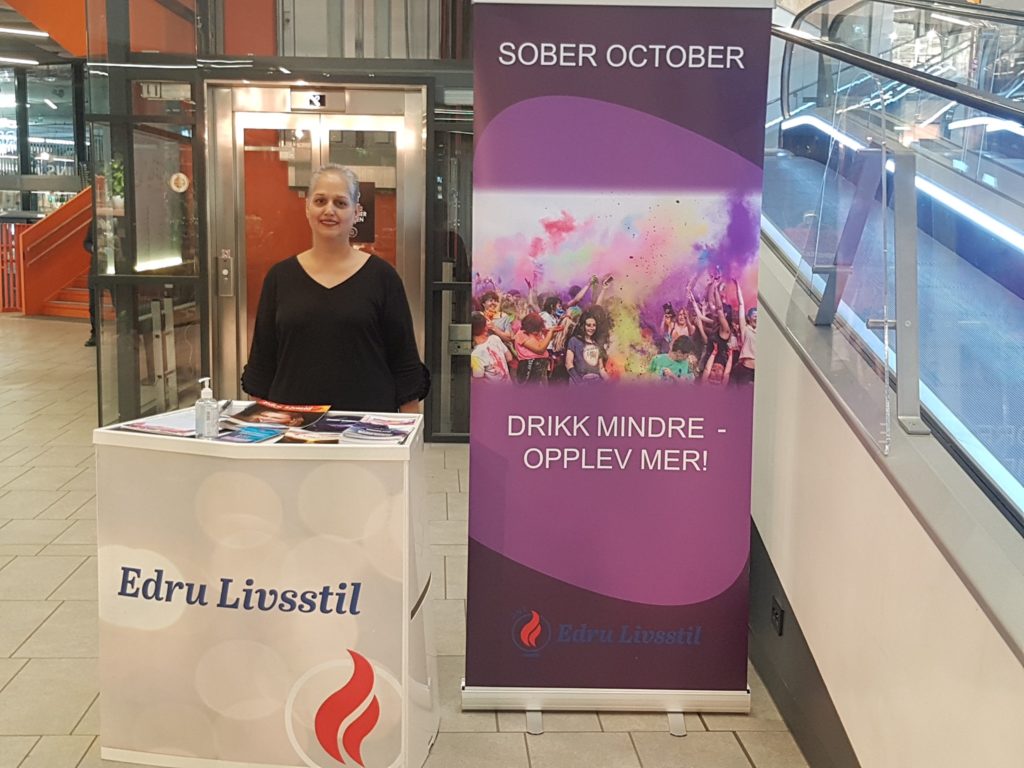
Edru Livstil (“Sober Lifestyle”) is organizing online workout sessions called “Sober Lifestyle Sporty“.
There is a Facebook group and every Monday new activities are streamed for people to join in and stay active and healthy during the crisis.
Edru Livstil: Sober October and Sober Together
Edru Livstil project Sober October was a hit as well as a student project “Together without” (Sammen Uten)
IOGT Norway: Support for families, people in recovery and food for the most vulnerable
IOGT in Norway is responding to the COVID-19 crisis with a host of activities. For example, they are arranging special online meetings about the topic of relapse – an issue that can affect people with substance use disorders during home quarantine.
Other activities IOGT in Norway is providing are:
- Emergency and help phone line.
Every day, including holidays and weekends, people who need help with their mental health and substance use, can reach IOGT Norway addiction experts by phone between 8am – 3am. And in Olso, people in need can also arrange one-on-one conversations. - Online meetings of IOGT Norway’s “Support’n-groups”.
Supporting people in recovery to maintain their sobriety has moved online but IOGT Norway keeps up its program of “Support’n-groups” as much as possible through virtual meetings. - Daily activity tips for families to spend the Easter holidays, as part of IOGT Norway’s “Outstanding Families” program.
“Outstanding Families” is IOGT Norway’s activity and support offering for parents who are often alone with their children and seek connection, community and support. - “Together Centers” shift focus of activities.
The so-called “Together Centers” of IOGT in Norway have to be closed and cannot provide shelter and support for people with substance use problems. But IOGT staff and volunteers of the “Together Centers” in different cities around Norway have shifted the focus of their activities and are now making sure to provide food and overdose prevention to vulnerable people.
JUBA
JUBA, the Norwegian child rights organization of the sobriety movement, is running a program called “Trygg Oppvekst” (Growing Up Safely) – to empower children with wholesome coping techniques and skills for life.
They are now assisting children with tips for how to deal with the disruption of normal life and related anxiety, stress and emotional turmoil.
Juvente Norway
Juvente, the youth organization of the Norwegian sobriety movement, has launched SOBERCRAFT – its very own minecraft server. It’s a new way to combine virtual hangout with video gaming and the alcohol-free way of life.
Center for Youth Education, Bosnia and Herzegovina: Supporting young people online and making protective equipment for healthcare workers
The COVID-19 pandemic has caused many serious problems all around the world, but also poses some new challenges for the operations and activities of the “Centar za edukaciju mladih”. The Center for Youth Education (CEM) from Travnik, Bosnia and Herzegovina, adjusted quickly as the first public health protection measures were implemented, and switched the majority of their programs and activities online – calling all members to stay at home.
This means that all members’ meetings are now being conducted online. In addition, CEM designed completely new online programs to assist young people spend their free time in quality, creative and fun ways.
One of the examples is the “Freshman Guide” which is for future students.
- This program is implemented with the alumni group of CEM’s volunteers who are successful students in universities in Bosnia and Herzegovina. CEM organizes online video meetings with them to present the reality of studying in different colleges and faculties and to help high school students get the information they need to choose their future profession.
- Each meeting is related to one faculty or college and CEM alumni talk about their experiences regarding the enrolment procedure, preparing for exams, planning time, recharging energy, failing exams and much more.
- The meetings are interactive and motivate young people to ask questions about everything they want to know concerning the faculties and student life in general and to get information in a more relaxed way than the official channels from the universities.
- Access to the meetings is completely free for all interested young people.
Since so much time at home can be pretty boring, especially for young people who have a lot of energy, CEM started another online program called Inspire Freedom. It offers young people ideas on how to spend their free time at home in interesting, creative and useful ways. This program offers young people to:
- Read CEM’s volunteers’ blog about their “stay-home adventures”,
- Watch their videos about how they spend their free time at home,
- Talk online with successful young people about their success stories and recipes.
Implementing this online program, CEM wants to inspire young people to try some of the creative activities at home and to think of making some new decisions and steps after the pandemic is over.
Caring for children and youth is more important than ever, especially in this time of challenges, uncertainty, and anxiety. Other programs CEM is conducting online now are:
- Big Brother, Big Sister program, providing support for younger adolescents by more experienced older youth, and
- Online language courses, for example to learn Italian and/ or German.
In addition to providing real help, support and inspiration for young people, CEM is also responding to the crisis by using its facilities to actually produce much needed protective equipment for healthcare workers in Bosnia.
CEM: 3-D Printing protective equipment
CEM is using its 3-D printers and office space to make protective equipment for healthcare professionals. Through the resources of its BeeZone Business Incubator, CEM immediately commenced the process of developing protective equipment as soon as the need among Travnik health professionals became apparent. It is these healthcare workers who are fighting the spread of coronavirus and CEM committed to supporting them as much as possible.
IOGT in Germany: Around the clock support for people in need
IOGT in Germany normally runs local clubs and self- and mutual aid groups for recovery from substance use disorders all over the country, in total around 500. Due to the strict physical distancing rules in Germany, all these activities had to be closed for the time being.
IOGT Germany has adapted by moving as many meetings as possible to online forums. Importantly, the organization has also started a phone helpline that is open 24 hours, seven days of the week, for anyone who needs support with substance use problems, their recovery and maintaining their sobriety.
IOGT Germany is also investing in promotional material for this helpline, to increase access to and awareness of this resource for people who might be struggling.
Like in IOGT-NTO in Sweden, IOGT in Germany has a similar motto: keeping physical distance and maintaining social proximity and connection. Through different online channels are the members of IOGT in Germany supporting one another, sharing inspiration for the alcohol-free way of life, for staying healthy and for remaining upbeat and optimistic.
In times of crisis, people with mental health problems, including substance use disorder, are more vulnerable. IOGT Germany has therefore joined an advocacy campaign in support of a call for the provision of adequate, low-threshold services for people with substance use disorders and addiction. In this context, volunteer-driven self- and mutual-aid groups are an invaluable resource to provide support and offer services – especially now that the formal healthcare system is on the brink.
Slovenia: Advice for parents and political work to prevent and reduce alcohol harm
Our member organization in Slovenia, the Institute for Research and Development “Utrip” (UTRIP) has partnered with other civil society organizations in the country under the umbrella of the Slovenian NCD Alliance to submit a proposal for immediate alcohol policy measures during the COVID-19 crisis, including a ban on online sales and delivery of alcohol at home during the pandemic.
As world-class prevention experts, UTRIP is also sharing parenting advice in the social media, to support families, caregivers and children during these difficult times with useful coping techniques.
COVID-19 parenting tips:
6⃣ Be open & listen. Be honest. Be supportive.@WHO @UNICEF @end_vac @CDCgov @USAID @PreventPlatform @issupnet @euspr @Movendi_Int @WFAD_info @theVNGOC #prevention #parenting #health
More here: https://t.co/qViOBJY39L pic.twitter.com/kugxIX0YJz
— UTRIP in self-isolation #stayhome (@utrip) April 13, 2020
Slovakia: Raising population-level awareness about alcohol harms in relation to the COVID-19 public health crisis
Our member organization Movendi.SK was able to publish an article in one of the biggest daily newspapers in Slovakia to inform the broader public about the harm linked to alcohol.
The article encourages people to stay alcohol free, to avoid or at least reduce their alcohol use during the COVID-19 crisis, due to alcohol’s immunosuppressant effects and other dangers to an individual’s health.
Movendi.SK furthermore raises awareness about the societal aspects of alcohol harm, especially violence against women and abuse and neglect of children – dimensions that are of significant importance during the current public health crisis.
The third level of the article is an analysis of alcohol’s burden on the health system and on the overall health of the population in the country. Alcohol causes so called civilizational diseases (NCDs), such as cancer, heart disease, liver disease and mental ill-health – all of which increase the risk of COVID-19 infection and mortality.
Movendi.SK argues that the current public health crisis is worsened by the underlying alcohol harm epidemic in Slovakia and that health promotion and disease and risk factor prevention should emerge as national priorities after the novel coronavirus is defeated.
Friends of Temperance in Finland and their digital Mocktail bar events

During the months of COVID-19 pandemic, Friends of Temperance decided to promote alcohol-free lifestyle and encourage others to try their own home-made alcohol-free drinks. The action was run online mostly through Facebook profile. Friends of Temperance were providing various recipes for attractive non-alcoholic mocktails. The organization was through online activities spreading awareness on benefits of sober lifestyle as well as supporting people in their sobriety. The online campaign aimed at supporting people in living free from alcohol and other drugs and taking care of themselves during the difficult times of lockdown and other consequences of COVID-19 pandemic. Friends of Temperance have also encouraged people to celebrate Sober Summer. They have collected and shared online young people’s twitter posts describing the reasons for being sober and celebrating Sober Summer. Through those actions, Friends of Temperance have been supporting people in remaining sober and showing them solutions for coping with problems caused by COVID-19.
CZOR Serbia: protection of minors from availability of alcohol
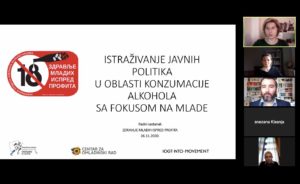
During the pandemic of Covid-19, and heightened concerns about the immunity that disrupts alcohol consumption, Centre for Youth Work turned to advocating policy changes that would contribute to greater protection of the population, especially minors, from the harmful effects of alcohol. That is why CZOR Serbia gathered representatives of the government, parliament, WHO and different UN offices in Serbia, as well as the Institute of Public Health, at a joint meeting in November. This initiative has received great attention and support from 10 government bodies, national and international organizations. Parliamentary representatives have recognized this topic as a priority to be addressed in the coming period, and activities will be aimed at holding a public presentation of public policy research conducted by the Centre for Youth Work in the Serbian Parliament. Also, the improvement of the Law on consumer protection will be initiated with a special emphasis on the protection of minors from the availability of alcohol.
‘’We are not happy that a pandemic has occurred, but we are certain that it has made decision makers realize the harmfulness of alcohol to everyone’s health, and that our story is evolving towards next year.’’
IOGT Iceland: community support during COVID-19 pandemic
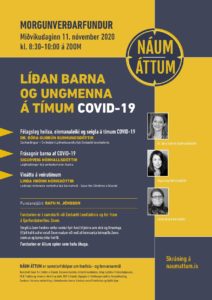
Even though the physical meetings and regular activities such as Friday night dance cannot be organized at the moment, IOGT Iceland uses new and old technology to stay in touch with their members. All activities organized by local clubs in Iceland are now held online which gives an opportunity to reach broader audience. Members of IOGT Iceland contact each other often and support one another in those difficult times of pandemic. IOGT Iceland is involved in alcohol policy advocacy in Iceland, especially intense during COVID-19 and many changes related to alcohol availability. IOGT Iceland focuses on prevention work participating in online meetings with prevention specialists and politicians. In November and December they are developing the online campaign ‘’White Christmas’’ directed at safety of children from families with alcohol problem.